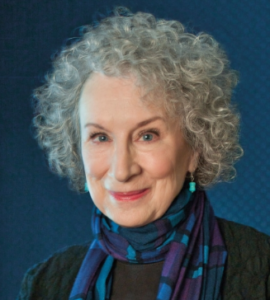 Margaret Atwood wrote The Handmaid’s Tale in 1985. RICHARD RECEIVES REPLY FROM BARB KAY to his comments about The Handmaid’s Tale which won the 1985 Governor General’s Award and the first Arthur C. Clarke Award in 1987; it was also nominated for the 1986 Nebula Award, the 1986 Booker Prize, and the 1987 Prometheus Award. It has been adapted for the cinema, television, radio, opera, and stage.
Margaret Atwood wrote The Handmaid’s Tale in 1985. RICHARD RECEIVES REPLY FROM BARB KAY to his comments about The Handmaid’s Tale which won the 1985 Governor General’s Award and the first Arthur C. Clarke Award in 1987; it was also nominated for the 1986 Nebula Award, the 1986 Booker Prize, and the 1987 Prometheus Award. It has been adapted for the cinema, television, radio, opera, and stage.
Now it comes to TV, the premier episode debuted on Sunday, April 30.
It is a very engaging production.
 Magaret Atwood is a literary monarch in writers in Canada, has been such for many years and now she engages a new audience with the TV series, ‘The Handmaid’s Tale.”
Magaret Atwood is a literary monarch in writers in Canada, has been such for many years and now she engages a new audience with the TV series, ‘The Handmaid’s Tale.”
After the first episode premiered, reviews hit the media, not all of which were positive.
 Barbara Kay, a writer for the National Post, taught English Literature and Composition for many years both at Concordia University and in the Quebec CEGEP system. She is a Woodrow Wilson fellow. In the late 1990s and early 2000s, Barbara was a board member of the magazine Cité libre and a frequent contributor to its pages. Barbara has been a National Post columnist since 2003. Barbara is the co-author of Unworthy Creature: A Punjabi Daughter’s Memoir of Honour, Shame and Love, published May 2011.
Barbara Kay, a writer for the National Post, taught English Literature and Composition for many years both at Concordia University and in the Quebec CEGEP system. She is a Woodrow Wilson fellow. In the late 1990s and early 2000s, Barbara was a board member of the magazine Cité libre and a frequent contributor to its pages. Barbara has been a National Post columnist since 2003. Barbara is the co-author of Unworthy Creature: A Punjabi Daughter’s Memoir of Honour, Shame and Love, published May 2011.
Read Barbara Kay’s review of the Atwood novel: Kay’s review

My letter to Barbara Kay regarding her review of The Handmaid’s Tale
Barbara Kay
The National Post
Hello Barbara,
I am certain you will agree that it’s always nice to get feedback from a reader and this is such a missive.
Your column relating to Margaret Atwood’s TV series, “The Handmaid’s Tale” left me a bit perplexed. Either you were restricted by editors limiting your number of words which would have precluded you writing both sides of the topic, or for the sake of column brevity you did not deal with the opposing considerations, or you simply didn’t see the other side.
First, I didn’t like the premier episode which might be the precursor of what is coming. It was drab, depressing and plodding. However, the plot plausibility was believable. Women being subjugated into roles as society’s breeders. Interesting. The plot is not likely because people balk at every possibility of controls being imposed on them in our society. Our society feels it has an entitlement to question every and any authority figure and so each is questioned, confronted and opposed regardless of social/political status.
You fail to give Atwood freedom of dramatic license. As a writer, she is free to bend the truth, tamper with facts, and modify reality. After all, it’s fiction.
You fail to find any redemption in her work, criticizing her for altering historical sources and castigating her for depicting women as social sycophants in the Nazi era.
Give Atwood her due
Atwood wrote the story to entertain. She wrote it to inspire readers’ creativity in foreseeing the future. Women, as well as men, are acquiescent creatures yielding to superior authority more often than not when there is a benefit to be gained. Just as the Nazi breeders basked in the benefits of being breeders for that society, people today will abandon their values often for personal gain. “Opportunism over morality” is trans-morphed into ‘personal gain trumps principles.’
Your conclusion of “plots of dystopic novels based in ideology rather than observed reality can be just plain silly, with The Handmaid’s Tale a perfect case in point” is short-sighted. You are far more sophisticated and intelligent for me to lecture the obvious which is that all writing is based on ‘observed reality.’ Atwood’s opus is no different. Simply be reminded her fiction was inspired by life.
* * * * * * * * * * * * * * * * * * * ** * * * * * * * * ** * * * * * * * * *
On another note:
my views of the series based on the opening episode:
What I liked
I feel anyone’s subjugation is wrong and my irritation grows when I see such depicted. Atwood may deserve high regard if she sought emotional engagement with viewers. I was very emotionally engaged.
If Atwood’s goal was to develop negative feelings about her lead villains, bravo, she was very successful. The commander’s wife was detestable, cold, abusive, disengaged from any kind of empathy or sympathy for any of the Handmaids. But again, repeated detestable actions become less alienating with each repetition until the protagonist has no feeling left.
What I disliked
I disliked the first episode because it created negative emotions in me which had to have occurred in the movie’s protagonists. I was angry at Offred for not showing flashes of anger from within herself, not showing spurts of rebellion in her thinking at least.
This was not an inviting movie to watch. Its atmosphere was one of sterility, doom, gloom and depression. Tight camera shots, gloomy sets, gloomy room settings, even the outdoor shots evoked depressive feelings in a viewer. This was not ‘La la’ land but more of a ‘Wham bam ma’am’ land. Step out of line and you may be stepping into the line of authoritarian society’s bullet.
Bottom line
Atwood undoubtedly has explained her thinking behind The Handmaid’s Tale, undoubtedly explained her aims and goals. If they were to engage the reader/viewer, evoke certain emotions, and make the reader/viewer think, she has really succeeded. I am fully engaged and feel manipulated…and I don’t like it.
* * * * * * * * * * * * * * *
[su_highlight background=”#f2ec2e” color=”#f32323″]REPLY FROM BARB KAY (of the NATIONAL POST)…[/su_highlight]
_______
Thanks for writing Richard.
To your first point about “both sides” I would say that as an opinion columnist, it is my job to give my side, not both. Let Atwood give her side if she wants. Most critics giving it rave reviews are giving “their” side. That’s what makes for opinion journalism.
Atwood is free to write whatever she wants in a fiction novel based in the future. I give fiction writers all the licence they want. But as a reader, I have the licence to be turned off or disappointed in the framework of their fiction. Which is the case here? All I am saying is that I can’t be engaged by any futurist novel that doesn’t begin with a grain of credibility. For example, have you ever read Jonathan Swift’s famous essay, “A Modest Proposal”? it recommends the many ways in which a baby if cooked with care, can be a nourishing source of nutrition. It was a horrifying premise, but it made a tremendous impact because the poverty in Ireland was so awful and England was doing nothing to relieve it. People actually were on the verge of starvation. So his shocking suggestion was a biting satire with a message that resonated because of its grain of reality as the premise, and it became a wake-up call to political leaders.
I am sorry, but I do not believe Atwood wrote the story merely to entertain. If you have read any of her other novels, you would know she is an ardent feminist who always writes with political messages in mind. She clearly believes that there is a tendency in our society to subjugate women, a tendency strong enough to give the idea of this forced-breeding program an air of plausibility. I see no plausibility here at all. Especially not the idea that it would be Christians that initiated it. Women in western society are not subjugated at all. They are fully empowered. So it doesn’t make any sense to me at all.
Right now in the world there are many countries in which slavery is legal. Sex slavery is also occurring regularly and is considered legal where it happens. These are Muslim countries, not Christian. If she were writing about a Muslim takeover of Europe and the creation of a forced-breeding program, I would probably give her critical praise for undertaking such a difficult topic and opening up a discussion about a potential threat to civilization that one can believe in. In 1985 I would not have faulted Atwood for not realizing how huge a force Islamism would be in the West. But now we all do know. And yet here we are fretting about Christian patriarchy? Please. Where is the basis for the threat? There is none. Sure, evangelical Christians believe the husband is the head of the house. So what? Orthodox Jews won’t eat pork. Does that mean we’re in danger of a mass eradication of pig farmers? Smoke and mirrors. Everyone wants to be afraid of what they’re allowed to criticize and Christianity is an easy target.
Barb





